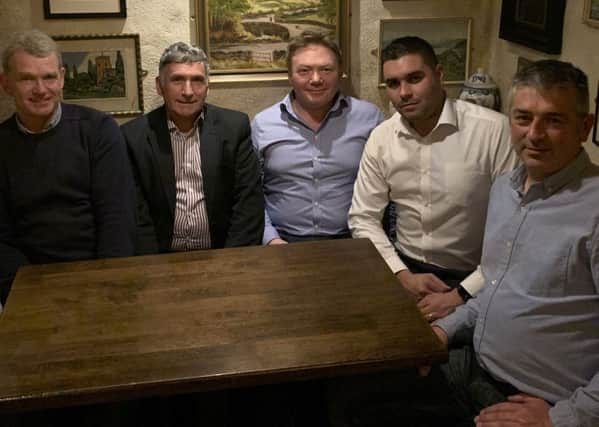Councillors meet with NBA chief


Following the meeting Councillor Alan Lewis said: “The National Beef Association (NBA) is the voice of the beef industry across the UK and when the opportunity arose to meet with its Chief Executive I gladly did so.
“During our discussion Chris Mallon highlighted the diverse and often innovative production systems utilised by beef farmers across the UK.
Advertisement
Advertisement
“However the reality is that beef farmers right across the UK, but especially here in Northern Ireland, are facing intense pressure at the moment. Prices are at such a level now that it is effectively impossible for farmers to make a profit in finishing cattle at present, no matter how efficient their enterprises are. The crisis in prices is now having a real impact on cash availability in the industry.
“The poor prices, combined with the total uncertainty surrounding Brexit – including on key issues such as the nature of future payments - is crippling the sector’s ability to plan for the years to come.
“Earlier this year there was a €100m Brexit compensation fund established for beef farmers in the Irish Republic to help offset some of the setbacks in prices that the industry there had faced. News of the fund came as a bitter blow for local producers in Northern Ireland who were – and still are – facing even far greater losses and uncertainty.
“I think it’s shameful that as the prices have continued to fall well below what would even constitute a minimum income, the UK Government has continued to sit back and do nothing. What’s even more outrageous is the fact that no MPs at Westminster are really putting any pressure on the Government. The largest Party in Northern Ireland is so concerned about their own self-interested demands that they’re not chasing what the farmer actually needs.
Advertisement
Advertisement
“During our conversation with Chris Mallon we also heard about the measures that DEFRA are taking to support farmers in England.
“To ease the financial strain and general stress on farmers who are down with TB, Northern Ireland I believe should really consider a similar scheme as available in England where cattle can be housed in isolation sheds in designated areas in the country under strict regulatory control.
“Those units can enable the isolation and testing of TB restricted cattle, potentially allowing them to be de-restricted before movement restrictions on other cattle groups in the herd are lifted. It’s the sort of sensible interim solution that Northern Ireland should be moving towards.
“Yet the reality appears that DAERA are simply not interested in moving forward on the TB issue at all. With no Minister in place, it looks like DAERA have lost what little motivation it had to tackle the disease.
Advertisement
Advertisement
“I felt our conversation with the NBA was an important opportunity for Harold and I to emphasise the deep anger and concern that there is locally about Boris Johnson’s latest Brexit deal. A border down the Irish sea would instantly lead to greater bureaucracy. Even the livestock going through the Port of Larne will need additional certificates to accompany their movement permits.
“When the Government are asked about the facilities and personnel that will be required to staff all this additional workload they say they have all their procedures in place. Yet the NBA was clear they are not ready for this at all - procedures means nothing.
“Overall it was a very useful discussion with the NBA and it allowed us to relay to him the concerns of farmers that we represent across the South Down region.”